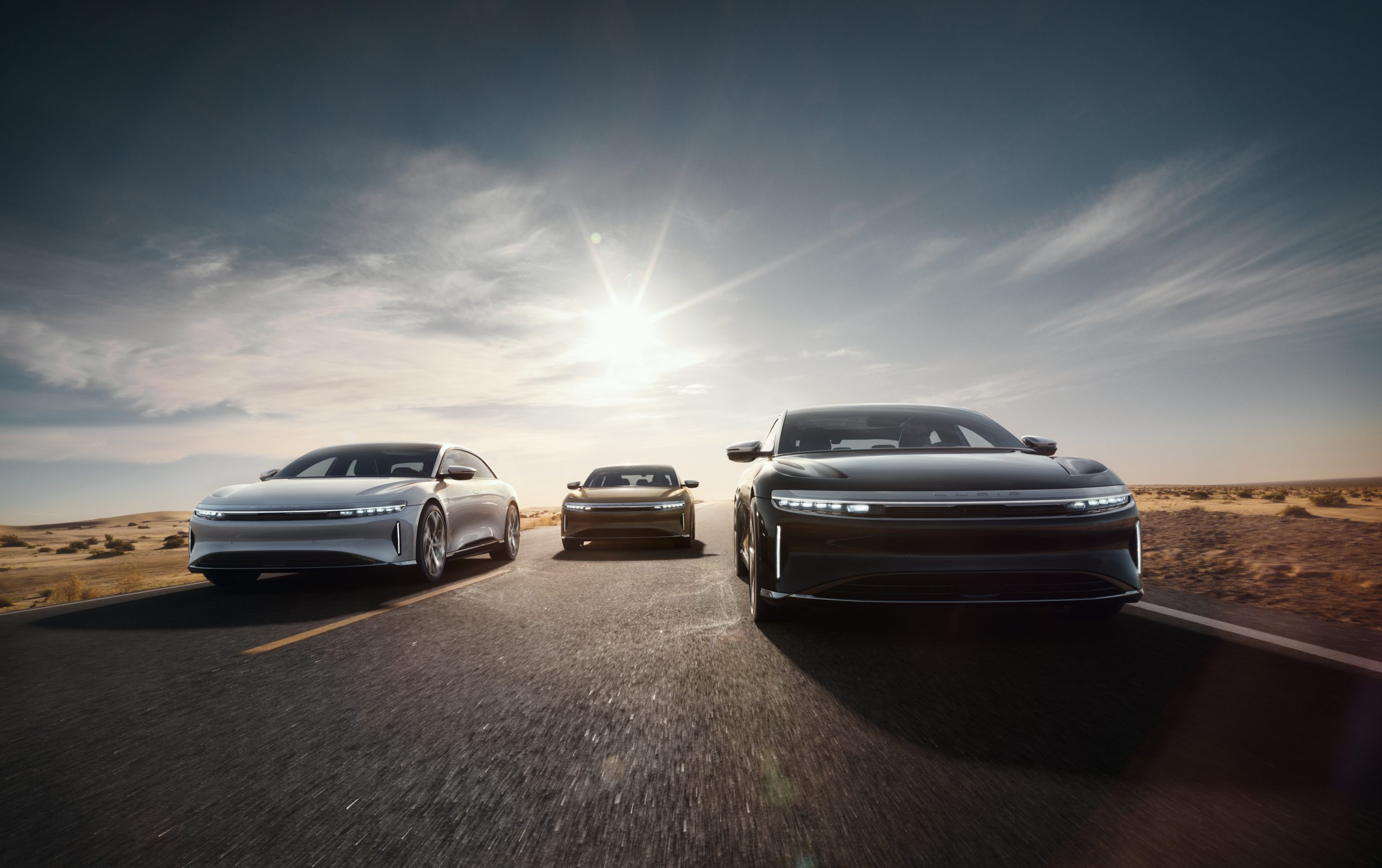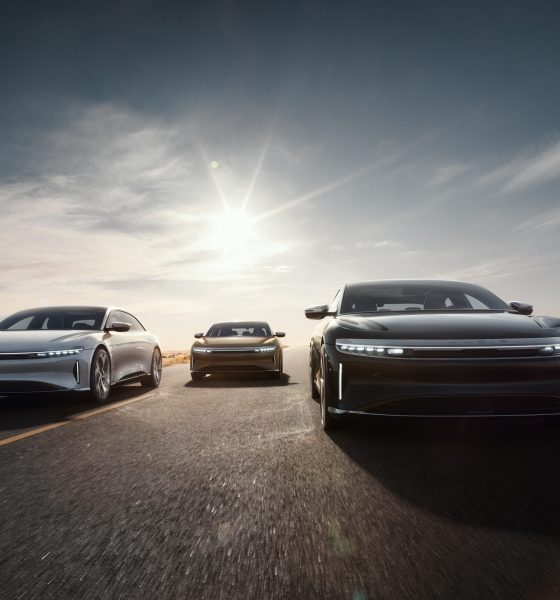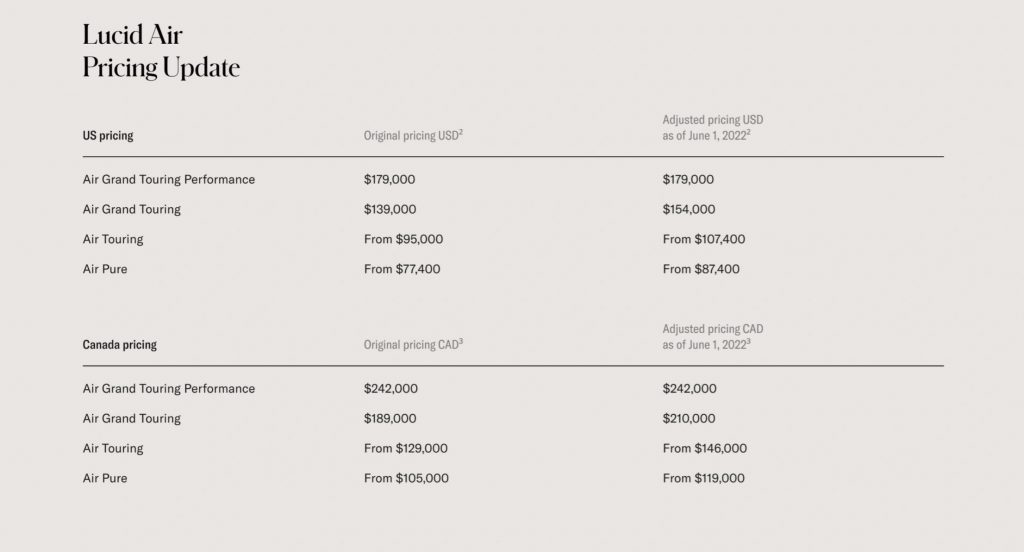

News
Lucid Air price increases due to rising raw material costs & supply chain challenges
Lucid Motors announced a price increase for its Lucid Air product line after releasing its Q1 2022 financial results. In an 8-K SEC filing, Lucid shared a statement from CEO and CTA Peter Rawilson about the Air’s price increase.
“We announced today that we are increasing prices of our vehicles that will go into effect at the beginning of June. The world has changed dramatically from the time we first announced Lucid Air pricing in September 2020, but I want to reassure our existing reservation holders that we will be honoring current pricing for them as well as for any new reservations made before the end of the month,” Rawilson stated.
As the Lucid CEO confirmed, the Air’s new pricing will go into effect on June 1, 2022. The EV automaker noted in its announcement that reservation holders would have “an opportunity to order” their Lucid Airs at the original price they reserved. Customers who order Lucid Air vehicles before June 1 will also avail the company’s current pricing. The new price list for the Lucid Air lineup is shared below.

In its 10-Q Sec filling, Lucid noted the ongoing impact of the COVID-19 pandemic. The automaker highlighted that the pandemic has caused logistics and supply chains challenges, including increased port congestion and supplier delays. It also mentioned a continued “shortfall” in semiconductor supply.
“In addition, prices and transportation expenses for these materials fluctuate depending on many factors beyond our control, including fluctuations in supply and demand, currency fluctuations, tariffs and taxes, fluctuations and shortages in petroleum supply, freight charges, and other economic and political factors. These risks could be further magnified by geographical developments such as the conflict between Ukraine and Russia. Substantial increases in the prices for our materials or prices charged to us, such as those charged by battery cell or semiconductor suppliers, would increase our operating costs and could reduce our margins if we cannot recoup the increased costs through increased prices,” Lucid’s 10-K filing said.
Lucid reported a Q1 revenue of $57.7 million. It delivered 360 vehicles in the quarter. The EV manufacturer claimed it saw strong demand with more than 30,000 customer reservations, reflection potential sales of $2.9 billion. Lucid maintains a volume out of 12,000 to 14,000 vehicles for 2022.
The Teslarati team would appreciate hearing from you. If you have any tips, reach out to me at maria@teslarati.com or via Twitter @Writer_01001101.

News
Tesla wins another award critics will absolutely despise
Tesla earned an overall score of 49 percent, up 6 percentage points from the previous year, widening its lead over second-place Ford (45 percent, up 2 points) to a commanding 4-percentage-point gap. The company also excelled in the Fossil Free & Environment category with a 50 percent score, reflecting strong progress in reducing emissions and decarbonizing operations.

Tesla just won another award that critics will absolutely despise, as it has been recognized once again as the company with the most sustainable supply chain.
Tesla has once again proven its critics wrong, securing the number one spot on the 2026 Lead the Charge Auto Supply Chain Leaderboard for the second consecutive year, Lead the Charge rankings show.
NEWS: Tesla ranked 1st on supply chain sustainability in the 2026 Lead the Charge auto/EV supply chain scorecard.
“@Tesla remains the top performing automaker of the Leaderboard for the second year running, and increased its overall score by 6 percentage points, while Ford only… pic.twitter.com/nAgGOIrGFS
— Sawyer Merritt (@SawyerMerritt) March 4, 2026
This independent ranking, produced by a coalition of environmental, human rights, and investor groups including the Sierra Club, Transport & Environment, and others, evaluates 18 major automakers on their efforts to build equitable, sustainable, and fossil-free supply chains for electric vehicles.
Tesla earned an overall score of 49 percent, up 6 percentage points from the previous year, widening its lead over second-place Ford (45 percent, up 2 points) to a commanding 4-percentage-point gap. The company also excelled in the Fossil Free & Environment category with a 50 percent score, reflecting strong progress in reducing emissions and decarbonizing operations.
Perhaps the most impressive achievement came in the batteries subsection, where Tesla posted a massive +20-point jump to reach 51 percent, becoming the first automaker ever to surpass 50 percent in this critical area.
Tesla achieved this milestone through transparency, fully disclosing Scope 3 emissions breakdowns for battery cell production and key materials like lithium, nickel, cobalt, and graphite.
The company also requires suppliers to conduct due diligence aligned with OECD guidelines on responsible sourcing, which it has mentioned in past Impact Reports.
While Tesla leads comfortably in climate and environmental performance, it scores 48 percent in human rights and responsible sourcing, slightly behind Ford’s 49 percent.
The company made notable gains in workers’ rights remedies, but has room to improve on issues like Indigenous Peoples’ rights.
Overall, the leaderboard highlights that a core group of leaders, Tesla, Ford, Volvo, Mercedes, and Volkswagen, are advancing twice as fast as their peers, proving that cleaner, more ethical EV supply chains are not just possible but already underway.
For Tesla detractors who claim EVs aren’t truly green or that the company cuts corners, this recognition from sustainability-focused NGOs delivers a powerful rebuttal.
Tesla’s vertical integration, direct supplier contracts, low-carbon material agreements (like its North American aluminum deal with emissions under 2kg CO₂e per kg), and raw materials reporting continue to set the industry standard.
As the world races toward electrification, Tesla isn’t just building cars; it’s building a more responsible future.
News
Tesla Full Self-Driving likely to expand to yet another Asian country
“We are aiming for implementation in 2026. [We are] doing everything in our power [to achieve this],” Richi Hashimoto, president of Tesla’s Japanese subsidiary, said.

Tesla Full Self-Driving is likely to expand to yet another Asian country, as one country seems primed for the suite to head to it for the first time.
The launch of Full Self-Driving in yet another country this year would be a major breakthrough for Tesla as it continues to expand the driver-assistance program across the world. Bureaucratic red tape has held up a lot of its efforts, but things are looking up in some regions.
Tesla is poised to transform Japan’s roads with Full Self-Driving (FSD) technology by 2026.
Richi Hashimoto, president of Tesla’s Japanese subsidiary, announced the ambitious timeline, building on successful employee test drives that began in 2025 and earned positive media reviews. Test drives, initially limited to the Model 3 since August 2025, expanded to the Model Y on March 5.
Once regulators approve, Over-the-Air (OTA) software updates could activate FSD across roughly 40,000 Teslas already on Japanese roads. Japan’s orderly traffic and strict safety culture make it an ideal testing ground for autonomous driving.
Hashimoto said:
“We are aiming for implementation in 2026. [We are] doing everything in our power [to achieve this].”
The push aligns with Hashimoto’s leadership, which has been credited for Tesla’s sales turnaround.
In 2025, Tesla delivered a record 10,600 vehicles in Japan — a nearly 90% jump from the prior year and the first time exceeding 10,000 units annually.
BREAKING 🇯🇵 FSD IS LIKELY LAUNCHING IN JAPAN IN 2026 🚨
Richi Hashimoto, President of Tesla’s Japanese subsidiary, stated: “We are aiming for implementation in 2026” and added that they are “doing everything in our power” to achieve this 🔥
Test drives in Japan began in August… pic.twitter.com/jkkrJLszXN
— Ming (@tslaming) March 5, 2026
The strategy shifted from online-only sales to adding 29 physical showrooms in high-traffic malls, plus staff training and attractive financing offers launched in January 2026. Tesla also plans to expand its Supercharger network to over 1,000 points by 2027, boosting accessibility.
This Japanese momentum reflects Tesla’s broader international expansion. In Europe, Giga Berlin produced more than 200,000 vehicles in 2025 despite a temporary halt, supplying over 30 markets with plans for sequential production growth in 2026 and battery cell manufacturing by 2027.
While regional EV sales faced headwinds, the factory remains a cornerstone for Model Y deliveries across the continent.
In Asia, Giga Shanghai continues to be recognized as Tesla’s powerhouse. China, the company’s largest market, saw January 2026 deliveries from the plant rise 9 percent year-over-year to 69,129 units, with affordable new models expected later this year.
FSD advancements, already progressing in the U.S. and South Korea, are slated for Europe and further Asian rollout, complementing plans to expand Cybercab and Optimus to new markets as well.
With OTA-enabled autonomy on the horizon and retail strategies paying dividends, Tesla is strengthening its footprint from Tokyo showrooms to Berlin assembly lines and Shanghai exports. As Hashimoto continues to push Tesla forward in Japan, the company’s global vision for sustainable, self-driving mobility gains traction across Europe and Asia.
News
Tesla ships out update that brings massive change to two big features
“This change only updates the name of certain features and text in your vehicle,” the company wrote in Release Notes for the update, “and does not change the way your features behave.”

Tesla has shipped out an update for its vehicles that was caused specifically by a California lawsuit that threatened the company’s ability to sell cars because of how it named its driver assistance suite.
Tesla shipped out Software Update 2026.2.9 starting last week; we received it already, and it only brings a few minor changes, mostly related to how things are referenced.
“This change only updates the name of certain features and text in your vehicle,” the company wrote in Release Notes for the update, “and does not change the way your features behave.”
The following changes came to Tesla vehicles in the update:
- Navigate on Autopilot has now been renamed to Navigate on Autosteer
- FSD Computer has been renamed to AI Computer
Tesla faced a 30-day sales suspension in California after the state’s Department of Motor Vehicles stated the company had to come into compliance regarding the marketing of its automated driving features.
The agency confirmed on February 18 that it had taken a “corrective action” to resolve the issue. That corrective action was renaming certain parts of its ADAS.
Tesla discontinued its standalone Autopilot offering in January and ramped up the marketing of Full Self-Driving Supervised. Tesla had said on X that the issue with naming “was a ‘consumer protection’ order about the use of the term ‘Autopilot’ in a case where not one single customer came forward to say there’s a problem.”
This was a “consumer protection” order about the use of the term “Autopilot” in a case where not one single customer came forward to say there’s a problem.
Sales in California will continue uninterrupted.
— Tesla North America (@tesla_na) December 17, 2025
It is now compliant with the wishes of the California DMV, and we’re all dealing with it now.
This was the first primary dispute over the terminology of Full Self-Driving, but it has undergone some scrutiny at the federal level, as some government officials have claimed the suite has “deceptive” names. Previous Transportation Secretary Pete Buttigieg was one of those federal-level employees who had an issue with the names “Autopilot” and “Full Self-Driving.”
Tesla sued the California DMV over the ruling last week.








